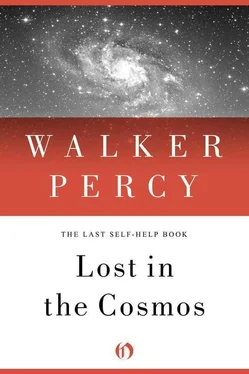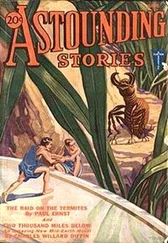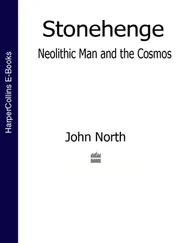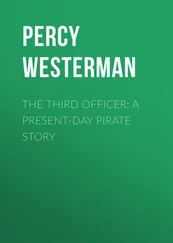Now, in the light of this alternative, consider the other alternative. You can elect suicide, but you decide not to. What happens? All at once, you are dispensed. Why not live, instead of dying? You are free to do so. You are like a prisoner released from the cell of his life. You notice that the door to the cell is ajar and that the sun is shining outside. Why not take a walk down the street? Where you might have been dead, you are alive. The sun is shining.
Suddenly you feel like a castaway on an island. You can’t believe your good fortune. You feel for broken bones. You are in one piece, sole survivor of a foundered ship whose captain and crew had worried themselves into a fatal funk. And here you are, cast up on a beach and taken in by islanders who, it turns out, are themselves worried sick — over what? Over status, saving face, self-esteem, national rivalries, boredom, anxiety, depression from which they seek relief mainly in wars and the natural catastrophes which regularly overtake their neighbors.
And you, an ex-suicide, lying on the beach? In what way have you been freed by the serious entertainment of your hypothetical suicide? Are you not free for the first time in your life to consider the folly of man, the most absurd of all the species, and to contemplate the comic mystery of your own existence? And even to consider which is the more absurd state of affairs, the manifest absurdity of your predicament: lost in the Cosmos and no news of how you got into such a fix or how to get out — or the even more preposterous eventuality that news did come from the God of the Cosmos, who took pity on your ridiculous plight and entered the space and time of your insignificant planet to tell you something.
The consequences of entertainable suicide? Lying on the beach, you are free for the first time in your life to pick up a coquina and look at it. You are even free to go home and, like the man from Chicago, dance with your wife.
The difference between a non-suicide and an ex-suicide leaving the house for work, at eight o’clock on an ordinary morning:
The non-suicide is a little traveling suck of care, sucking care with him from the past and being sucked toward care in the future. His breath is high in his chest.
The ex-suicide opens his front door, sits down on the steps, and laughs. Since he has the option of being dead, he has nothing to lose by being alive. It is good to be alive. He goes to work because he doesn’t have to.
(12) The Impoverished Self: How the Self can be Poor though Rich
MOTHER TERESA OF CALCUTTA recently remarked about some affluent Westerners she had met — including Americans, Europeans, capitalists, Marxists — that they seemed to her sad and poor, poorer even than the Calcutta poor, the poorest of the poor, to whom she ministered.
Question: What kind of impoverishment can be attributed to the denizens of Western technological societies in view of the obvious wealth of such societies in such categories as food, shelter, goods and services, education, technology, and cultural institutions?
(a) There is no such sadness and impoverishment. Mother Teresa makes such a charge because Western societies, with their increasing acceptance of contraceptive birth control and abortion, offend her Roman Catholic religious beliefs.
(b) There is, in fact, such a sadness and an impoverishment, due at least in part to a loss of respect for human life as evidenced not only by the acceptance of abortion but by mounting child abuse, euthanasia, and indifference to human suffering. Recent studies have shown, however, that Westerners, that is, Europeans and Americans, own more pets than ever and spend more money on pet food and veterinarians than the food costs of the entire Third World.
(c) There is such a sadness and impoverishment because in an affluent society, where there is a surfeit of goods and services, there is a corresponding devaluation. Whereas the poor peoples of the Third World, despite or because of their material deprivation, appreciate the simple things in life. Small is beautiful, the best things in life are free, etc.
(d) Because the poor in heart are blessed, i.e., receptive to the Gospel, whereas the rich may gain the whole world but lose their souls.
(e) Because Western society is an ethic of power and manipulation and self-aggrandizement at the expense of the values of community, love, innocence, simplicity, values encountered both in childhood and in non-aggressive societies (e.g., the Eskimo). As Ashley Montagu says, adulthood in the Western world is a deteriorated and impoverished childhood.
(f) Because Western society is itself a wasteland, its values decayed, its community fragmented, its morals corrupted, its cities in ruins. In the face of the deracination of Western culture, all talk of self-enrichment through this or that psychological technique is cosmetic, like rearranging the deck chairs of the Titanic. The Moral Majority is right. The only thing that can save us is a return to old-time religion, a revival of Christian Fundamentalism.
(g) None of the above. All arguments between the traditional scientific view of man as organism, a locus of needs and drives, and a Christian view of man as a spiritual being not only are unresolvable at the present level of discourse but are also profoundly boring — no small contributor indeed to the dreariness of Western society in general. The so-called détentes and reconciliations between “Science” and “Religion” are even more boring. What is more boring than hearing Heisenberg’s uncertainty relations enlisted in support of the freedom of the will? The traditional scientific model of man is clearly inadequate, for a man can go to heroic lengths to identify and satisfy his needs and end by being more miserable than a Calcuttan. As for the present religious view of man, it begs its own question, the question of God’s existence, which means that it is not only useless to the unbeliever but dispiriting. The latter is more depressed than ever at hearing the goods news of Christianity. From the scientific view at least, a new model of man is needed, something other than man conceived as a locus of bio-psycho-sociological needs and drives.
Such an anthropological model might be provided by semiotics, that is, the study of man as the sign-using creature and, specifically, the study of the self and consciousness as derivatives of the sign-function.
Thought Experiment: If Mother Teresa is right and there exists in modern technological societies a paradoxical impoverishment in the midst of plenty, in the face of what is by traditional objective scientific criteria the most extensive effort in all of history to identify and satisfy man’s biological, psychological, sociological, and cultural needs, consider a different model. Consider a more radical model than the conventional psycho-biological model, a semiotic model which allows one to explore the self in its nature and origins and to discover criteria for its impoverishment and wealth.
The following section, an intermezzo of some forty pages, can be skipped without fatal consequences. It is not technical but it is theoretical — i.e., it attempts an elementary semiotical grounding of the theory of self taken for granted in these pages. As such, it will be unsatisfactory to many readers. It will irritate many lay readers by appearing to be too technical — what does he care about semiotics? It will irritate many professional semioticists by not being technical enough — and for focusing on one dimension of semiotics which semioticists, for whatever reason, are not accustomed to regard as a proper subject of inquiry, i.e., not texts and other coded sign utterances but the self which produces texts or hears sign utterances.
Читать дальше












